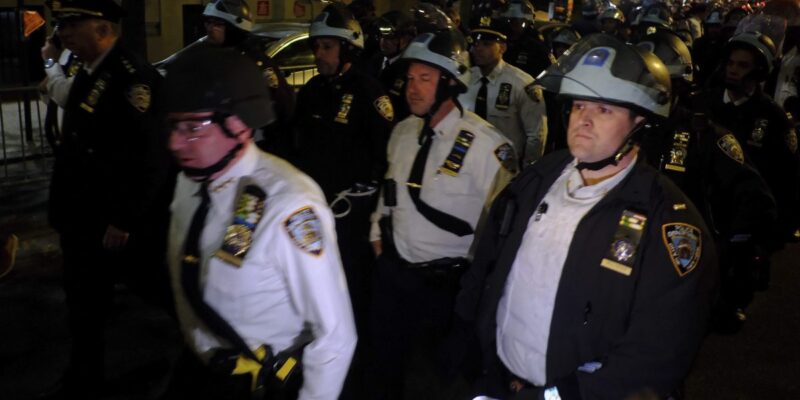
Police cleared and arrested protesters occupying Hamilton Hall at Columbia University on Tuesday night at the request of university administrators, marking a dramatic climax to the antiwar protesters’ standoff. As the drama unfolded, campus officials asked police to remain on campus until at least May 17.
The NYPD’s arrival on campus was its second this month, after President Minouche Shafik requested police dismantle the Gaza Solidarity Encampment the day after she appeared before Congress to discuss antisemitism on college campuses. During that April 18 sweep, police arrested more than 100 protesters. Shafik’s request that the NYPD return to campus tonight—outlined in a letter released by the university—reversed her administration’s previous position that bringing back the NYPD “would be counterproductive, further inflaming what is happening on campus, and drawing thousands to our doorstep who would threaten our community.”
A group of protesters took over Hamilton Hall early Tuesday morning, dubbing it “Hind’s Hall,” in honor of Hind Rajab, a 6-year-old Palestinian girl killed in January as part of Israel’s campaign in Gaza. They pledged not to leave the building until their demands—for the university to divest from Israel, financial transparency in Columbia’s endowment, and amnesty for pro-Palestinian protesters—were met. (On Monday, Columbia said it would not divest from Israel.)
The police raid Tuesday night came 56 years to the day after a weeklong 1968 sit-in by students protesting racism, the Vietnam War, and Columbia’s expansion into the nearby neighborhood; that standoff ended when police moved in and eventually arrested more than 700 people. Students occupying Hamilton Hall on Monday cited those protests as inspiration.
Student reporters with Columbia’s WKCR chronicled the dramatic rise in tensions as columns of police descended on the Morningside Heights area in riot gear during a breathtaking, hours-long broadcast. At around 8 p.m., more than two dozen protesters formed a human blockade outside Hamilton Hall, bracing for officers’ arrival, while others sang “Your people are my people,” the audio of which could be heard in the background of the student broadcast. Minutes later, the university emailed students and faculty demanding that they “shelter in place” or risk disciplinary action. “I’m not exaggerating when I say I saw a sea of riot police officers,” one WKCR reporter said on-air. Eventually, those officers told student reporters to get off campus; in one exchange heard on-air, a student radio reporter said, “Frankly, no one is left to document what’s happening at Hamilton Hall.” Later, Jelani Cobb, dean of the Journalism School, was seen demanding police allow his students access to Pulitzer Hall after they were refused access.
Just before 9:30 p.m., police used a ramp to enter Hamilton Hall through a window. “They’re completely flooding the building from all sides,” a student reporter said. By about 9:40, WKCR reported “brutal” images of “students being arrested and pinned on the ground—a much more brutal tactic than we saw” during the first NYPD sweep of the campus.
Some images & video from the scene tonight from @Jib821
📸: Najib Aminy/Mother Jones pic.twitter.com/pmwkFGSWax
— Julianne McShane (@JulianneMcShane) May 1, 2024
At a press conference earlier in the evening conducted by NYPD officials and Mayor Eric Adams, police said protesters occupying Hamilton Hall could be charged with third-degree burglary, criminal mischief, and trespassing, and that protesters who remained at the Gaza Solidarity Encampment on the nearby lawn could face charges of trespassing and disorderly conduct. Police did not immediately respond to a request for comment about how many arrests they had conducted at Columbia or what kind of jail time protesters could face on the charges if convicted.
A statement from Columbia spokesperson Ben Chang said that university officials “were left with no choice” but to bring in the police after learning protesters “occupied, vandalized, and blockaded” Hamilton Hall, allegedly forcing public safety personnel out of the building and threatening a member of the facilities team. Chang added that officials believe the group that occupied the building “is led by individuals who are not affiliated with the university.”
In her letter to police Tuesday night, Shafik also requested police maintain a presence on campus through May 17—two days after graduation is scheduled—“to maintain order and ensure encampments are not reestablished.” But the encampment is still partially standing tonight: Shortly after 10:20 p.m., about three-quarters of the tents remained on the lawn outside Butler Library.
Najib Aminy contributed reporting.
This is a developing story. Check back for updates.















